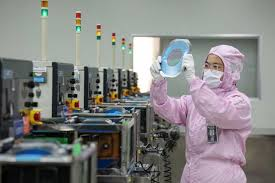China struggles to build car chip supply chain to break free of heavy reliance on imports
China’s surging electric vehicle (EV) output has ignited demand for automotive chips, but domestic firms remain reliant on foreign suppliers for more than 90 per cent of their needs, according to analysts and industry insiders.
Wang Qing, deputy director at the Development Research Centre, told another conference last year that China’s dependency on foreign auto chip suppliers was as high as 95 per cent. “For computing and control chips, the self-sufficiency rate is less than 1 per cent, while for power and memory chips, it is only 8 per cent,” he said.
China’s dependence on imported auto chips has become a more pressing issue as Beijing seeks to assert leadership in the global EV market amid heightened geopolitical tensions with the US. In May, Nikkei Asia reported that the Chinese government had urged the country’s carmakers to source up to 25 per cent of their chips domestically by 2025.
The pressure comes amid explosive growth in EV production. As of November, China had produced 11.49 million EVs for the year, an increase of 37.5 per cent year on year, National Bureau of Statistics data showed. Further, EVs accounted for 40.8 per cent of all cars manufactured in the country.
The EV boom has led to soaring demand for semiconductors, as electric and smart vehicles require significantly more chips than traditional internal combustion engine cars. The China Association of Automobile Manufacturers (CAAM) said that traditional cars typically require 600 to 700 chips per vehicle, while EVs need about 1,600. Smart vehicles, equipped with more advanced features, demand as many as 3,000 chips.
The rising chip density is also translating into higher semiconductor value per vehicle. He Hao, a president at Seres Automobile, a carmaker collaborating with Huawei Technologies, told an industry conference in June that chip costs as a percentage of total vehicle costs would climb from 4 per cent in 2019 to 20 per cent by 2030.
Despite Beijing’s push, China’s automotive sector remains far from achieving semiconductor independence. Global players such as Infineon Technologies, NXP Semiconductors, STMicroelectronics, Texas Instruments, and Renesas Electronics continue to dominate the market.
#AutomotiveIndustry#ChipManufacturing#CarChips#SupplyChainCrisis#SemiconductorShortage#ImportSubstitution#SelfReliance#CarChips#EconomicDevelopment#TechInnovation
International Young Scientist Awards
Website link: youngscientistawards.com
Nomination Link: https://youngscientistawards.com/award-nomination/?ecategory=Awards&rcategory=Awardee
Contact Us: support@youngscientistawards.com
_________________________________________________________________________________________________________
Social Media:
Twitter : https://twitter.com/youngsc06963908
Linkedin- : https://www.linkedin.com/in/shravya-r...
Pinterest : https://in.pinterest.com/youngscienti...
Blog : https://youngscientistaward.blogspot....
Tumblr : https://www.tumblr.com/blog/shravya9v




Comments
Post a Comment